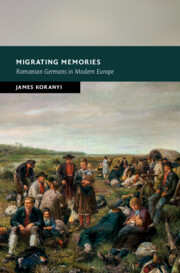Book contents
- Migrating Memories
- New Studies In European History
- Migrating Memories
- Copyright page
- Dedication
- Contents
- Figures
- Acknowledgements
- Note on the Text
- Introduction Stories, Identities, Memories
- Chapter 1 Making Romanian Germans
- Chapter 2 Transnational Germans
- Chapter 3 Fascist Divisions in the Romanian German Past
- Chapter 4 The Iron Memory Curtain: Romanian Germans and Communism
- Chapter 5 European Bridge-Builders: Romanian Germans after 1989
- Epilogue The Perpetual Exodus
- Bibliography
- Index
Chapter 3 - Fascist Divisions in the Romanian German Past
Published online by Cambridge University Press: 09 December 2021
- Migrating Memories
- New Studies In European History
- Migrating Memories
- Copyright page
- Dedication
- Contents
- Figures
- Acknowledgements
- Note on the Text
- Introduction Stories, Identities, Memories
- Chapter 1 Making Romanian Germans
- Chapter 2 Transnational Germans
- Chapter 3 Fascist Divisions in the Romanian German Past
- Chapter 4 The Iron Memory Curtain: Romanian Germans and Communism
- Chapter 5 European Bridge-Builders: Romanian Germans after 1989
- Epilogue The Perpetual Exodus
- Bibliography
- Index
Summary
The National Socialist period was the central formative experience for Romanian Germans, and their identity debates were refracted through the legacy of National Socialism and the Second World War. This chapter charts the origins of these debates in the interwar period, places them in their respective contexts of Cold War Romania and West Germany, and explores the reverberations of these debates in post-Communist Europe. The circle around the Romanian German literary magazine Klingsor in the 1920s and 1930s rehearsed many of the arguments that were to occupy the Romanian German émigré public in the 1970s and 1980s. If the Klingsor writers were part of an interwar European right-wing ‘youth’ movement, then the same ‘old men’ of the 1970s and 1980s formed the vanguard to a turbulent revisionist decade over the fascist past. Far from being a parochial debate about a marginal group, the Romanian German memory wars and ‘little historians’ dispute’ of the 1980s reflect a European and transnational process of making sense of European fascism, war, and expulsions.
Keywords
- Type
- Chapter
- Information
- Migrating MemoriesRomanian Germans in Modern Europe, pp. 115 - 172Publisher: Cambridge University PressPrint publication year: 2021

